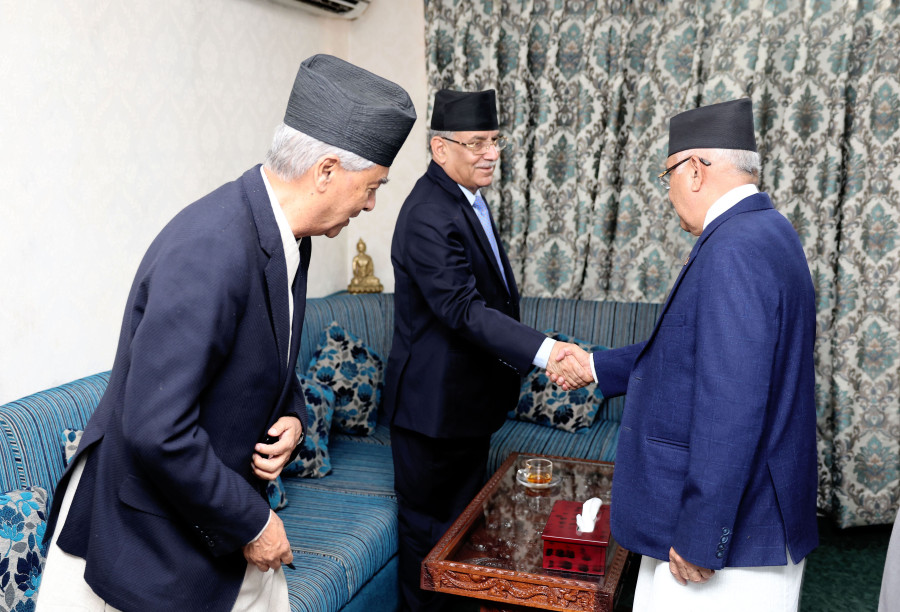Politics
Will UML help the coalition on transitional justice bill?
As the ruling parties want to fast-track the bill, the role of the second-largest party is being keenly watched.
Tika R Pradhan
In the last week of January, the prime minister's chief advisor Haribol Gajurel told the Post that Pushpa Kamal Dahal wanted to become prime minister for a third time mainly with the aim of concluding the protracted peace process.
Dahal, the chair of the third-largest party in parliament, the CPN (Maoist Centre), became prime minister on December 25 with the support of the CPN-UML, the second-largest party in the House.
But with the prime minister opting to sail along with the Nepali Congress on board, the UML, which has always been ‘non-cooperative’ towards the Maoists and the Congress on issues of the peace process, has now opposed Dahal’s proposal to fast-track the passage of the amendment bill on the Truth and Reconciliation Commission (TRC) Act.
Although some leaders claimed that UML chair KP Sharma Oli, who is opposed to fast-tracking the bill, could ultimately help endorse it if his party is given leadership of some parliamentary committees, “concluding the peace process will still be a tightrope walk for the prime minister,” according to Gajurel.
Seventeen years have passed since the peace process began following the signing of the Comprehensive Peace Accord in 2006. But major political parties are still blaming each other for the delay in concluding the process. Needed amendments to the laws have not been made while the two commissions created to provide justice to the insurgency victims remain largely ineffective.
The two sides to the conflict agreed on three tasks as key components of the peace process—integration of Maoist combatants into security forces, promulgation of a new constitution through the Constituent Assembly, and providing justice to the conflict victims through a transitional justice [TJ] system. While Nepal has completed the first two components, the third task is yet to be accomplished.
The UML has been taking a tough stance against the Maoists and other stakeholders in the peace process, especially in cases of serious human rights violations.
Leaders of the second-largest party in parliament said the UML would help complete the peace process if such an attempt is made in the victims’ interest.
“But what we see is that the ruling parties want to save those who victimised people during the conflict,” said UML leader Sher Bahadur Tamang, a former law minister. “We won’t allow the ruling parties to endorse the bill in a haste without proper deliberations."
Political analyst Chandra Dev Bhatta, who regularly writes on the peace process, said the problem is that political parties have repeatedly used the process to serve their own interests.
“Unlike the Congress, the Maoist leaders and the erstwhile monarchs, the UML was not directly involved in the conflict and has continued to express its reservations on how other stakeholders have dealt with the peace process ,” Bhatta told the Post. “Unfortunately, major parties appear to be bargaining for power under the pretext of forging consensus on the peace process.”
Bhatta was referring to the UML’s possible bargaining, including on the leadership of parliamentary committees, before it lets the ruling coalition pass the TRC bill.
When reporters on Saturday inquired about the idea of forming a special committee to discuss the TRC bill, UML chair Oli said the issue was still under consideration among the three major parties.
“Discussions on this will continue,” Oli told reporters after the meeting on Saturday. The next meeting of the top leaders, including experts on the issue, has been scheduled for Tuesday morning.
The Maoist Centre leaders claimed that the UML’s role has been less than helpful.
“During the tenure of the previous House, the UML leaders initially agreed to a speedy endorsement of the bill, but later they stalled the bill,” said Hitraj Pandey, chief whip of Maoist Centre. “The UML’s role has never been positive–they have always tried to delay the process.”
Pandey said that this time also the UML is trying hard to send the bill to a parliamentary committee, even as the ruling coalition wants it endorsed through a parliamentary plenum.
Ganesh Datta Bhatta, former chief of the Truth and Reconciliation Commission, also blamed the major parties for the unnecessary delay in concluding the peace process.
“This is now an opportunity for the ruling parties to take the peace process to a logical end by amending the laws and taking the main opposition into confidence,” said Bhatta, who was appointed chair of the TRC by the KP Sharma Oli government. “I don’t think the UML leaders will have a big objection if the ruling parties try to take them into confidence.”
The law should ensure justice to the victims, Bhatta said. “This is also what the UML leaders have been saying, and they are not wrong in principle.”
As a consensus among the three major parties, including the UML, is vital to taking the process ahead, Bhatta said the process will remain stuck until the three major parties come together.
UML leaders, however, blamed the Maoist Centre for dilly-dallying on the peace process, fearing that many of its leaders could face legal action for grave human rights violations when their cases reach a decisive stage.
“The last Oli government had tried to take the process forward honestly, but Dahal seemed reluctant,” said Prithvi Subba Gurung, deputy UML general secretary. “He perhaps feared he had more to lose by doing so.”
Eight years after Nepal’s top court directed the government to amend the amnesty provisions in the Enforced Disappearances Enquiry, Truth and Reconciliation Commission Act in compliance with international principles of transitional justice and Nepal’s international obligations towards human rights, the Dahal-led government only recently took the bill to Parliament.




 9.6°C Kathmandu
9.6°C Kathmandu














